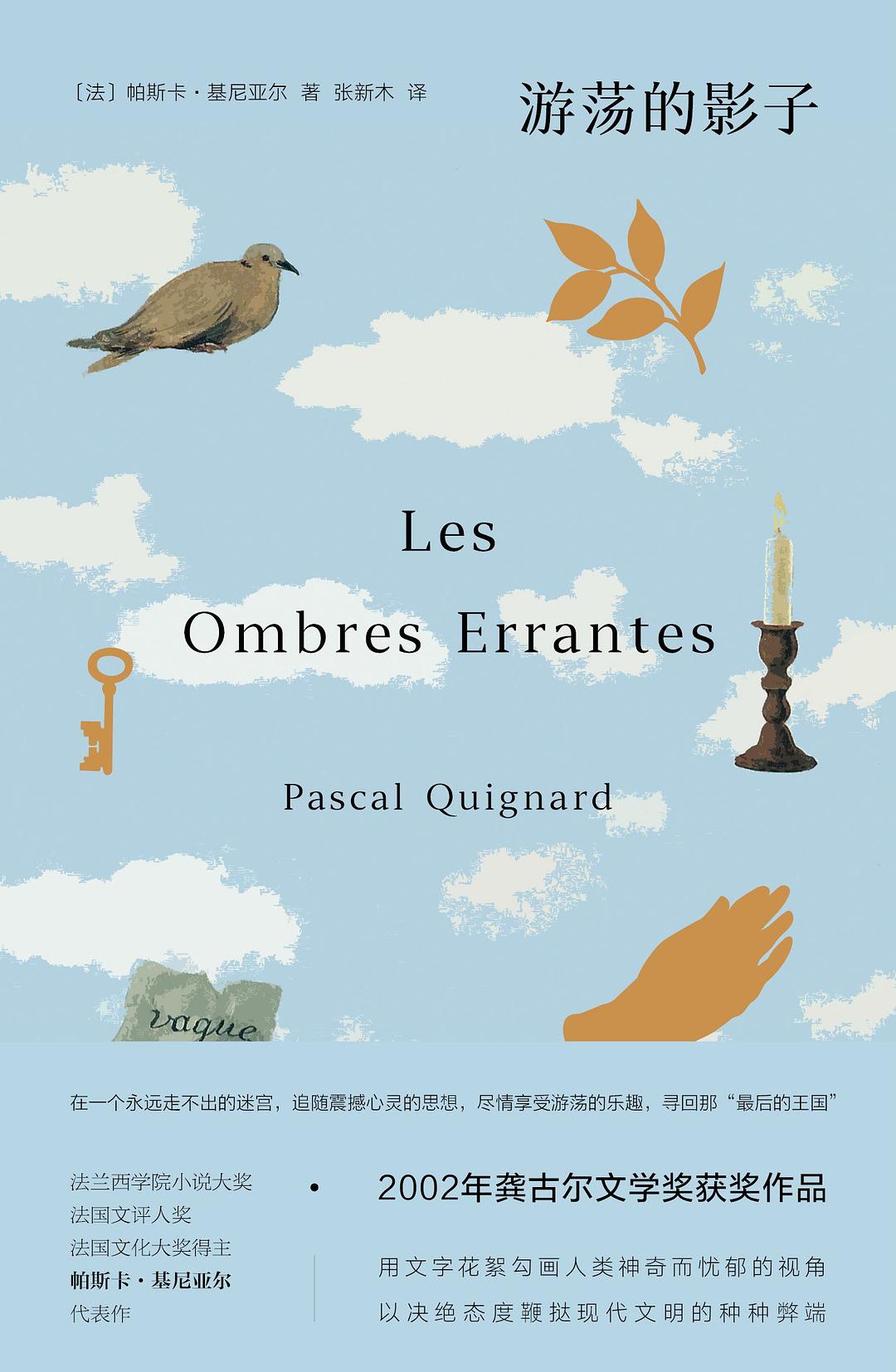WULOLIFE
《游荡的影子》 作者: [法] 帕斯卡·基尼亚尔 出版社: 南京大学出版社 译者: 张新木
《游荡的影子》 作者: [法] 帕斯卡·基尼亚尔 出版社: 南京大学出版社 译者: 张新木
Couldn't load pickup availability
Description
内容简介 · · · · · ·
2002何为游荡的影子?影子,那些未分离尘世的隐修者,那些超凡脱俗的思想家。游荡的影子们在安谧恬静的大自然中漫步,在历史在这部蒙田式的作品中,帕斯卡·基尼亚尔遭遇了这些游荡的影子,他执着于“不合时宜的沉思”,以思想密集的片段展开对弊端众多的现代文明的鞭挞,他批评进步这一概念。
法国当代著名作家帕斯卡·基尼亚尔曾获法兰西学院小说大奖、法国文评人奖。
也不是渊博的随笔,更不像小说性叙事,可以说与任何体裁都不相干。《游荡的影子》汇集了大量的文学片段,夹杂着个人经历、历史事件和个人思考,它并不对时间、人世、社会做出终结性评判,而只是一些“小小的思考”。
繁芜错杂,思想深刻。帕斯卡·基尼亚尔将历史想象、文学虚构、艺术审美和哲学思辨融为一体,以“不合时宜的人”的“不合时宜的沉思”鞭挞了现代文明的种种弊端,试图在艺术中找到通向永恒的秘密。
作者简介 · · · · · ·
帕斯卡·基尼亚尔(Pascal Quignard,1948—,法国著名小说家和散文家,龚古尔文学奖、法兰西学院小说大奖、法国文评人奖、法国文化大奖得主,在国际上亦享有盛誉。少年时期曾患自闭症,这对他日后的创作生涯影响重大。其作品以形式碎片化、内容杂糅、思想深邃为特征,代表作有《游荡的影子》《罗马阳台》《世间的每一个清晨》《符腾堡的沙龙》《秘密生活》等。
译者简介
新木,江苏高淳人,南京大学二级教授,博士生导师,文科学术委员,政府特殊津贴专家,中国法国文学研究会副会长。曾任南京大学外国语学院副院长、中国驻法国大使馆一等秘书。2006年获法国政府棕榈教育勋章2008学、符号学与法国文学。出版专著《法国小说符号学分析》和《普鲁斯特的美学》,译著《巴黎圣母院》《论诱惑》《模糊性的道德》《文学的政治》 《景观社会》等50余部,教材及编著10余部;在国内外发表学术论文6 0主持国家精品课程“法语阅读”。
目录 · · · · · ·
第二章(性享受的影子)6
第三章(第三者)12
第四章(巴米扬大佛)13
第五章北滩岛17
第六章(我们)24
第七章新生儿25
第八章(最后的王国)29
第九章圣瓶37
第十章(不在者)41
第十一章Cras42
第十二章(马)45
第十三章小船46
第十四章(黑色天空)48
第十五章影子49
第十六章2001年的清单58
第十七章(电视)61
第十八章关于圣西朗先生1638年5月14日被捕一事63
第十九章(普路托)65
第二十章(莫加多尔)78
第二十一章烛剪80
第二十二章(Ubi)87
第二十三章(曙光的方位)88
第二十四章(晨雾)91
第二十五章(荣纳河河岸)93
第二十六章数个世纪的不朽国王95
第二十七章圣巴泰勒米99
第二十八章惜别109
第二十九章韩愈111
第三十章贞女118
第三十一章(污泥)121
第三十二章莱顿的教堂122
第三十三章Post tenebras123
第三十四章Perditos133
第三十五章(万森纳城堡)134
第三十六章赤脚读者135
第三十七章Terror136
第三十八章(国王池)142
第三十九章(圣西朗)143
第四十章(朗斯罗)155
第四十一章(神奇先生)156
第四十二章手推车157
第四十三章(修道院)160
第四十四章(从贝克海姆到法兰克福)168
第四十五章(睡梦)179
第四十六章(猎人)181
第四十七章艾米莉190
第四十八章历史193
第四十九章(避难权)195
第五十章(潮滨)205
第五十一章在涌向花丛的河流上206
第五十二章(马克·安托万·夏庞蒂埃)214
第五十三章另一个王国217
第五十四章(耶路撒冷的王国)223
第五十五章索菲尤斯的最后日子224
